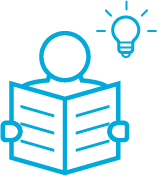This article briefly reviews progress in adult literacy, touches on existing perspectives on literacy, and illustrates four recent sources of information useful in the revitalised agenda offered by the United Nations (UN) Sustainable Development Goals (SDGs). By integrating literacy into the SDGs, literacy researchers can reveal the channels through which literacy can contribute to social welfare and transformation.
Author: David Post
Source: Post, D. (2016). Adult literacy benefits? New opportunities for research into sustainable development. Int Rev Educ, 62, 751–770. DOI 10.1007/s11159-016-9602-5
This article briefly reviews progress in adult literacy, touches on existing perspectives on literacy, and illustrates four recent sources of information useful in the revitalised agenda offered by the United Nations (UN) Sustainable Development Goals (SDGs). Data from the Programme for the International Assessment of Adult competencies (PIAAC) study conducted by the Organisation for Economic Co-operation and Development (OECD), the World Values Survey (WVS), and the World Bank’s Skills Toward Employment and Productivity (STEP) study are now available to researchers who wish to link educational change with attitudinal and behavioural change. Another important resource are the emerging data on mobile learning. By integrating literacy into the SDGs, literacy researchers can reveal the channels through which literacy can contribute to social welfare and transformation.
- While literacy rates increased sharply during the 1960s and 1970s, progress toward the elimination of adult illiteracy proved elusive over the years since the World Conference on Education for All (EFA) in Jomtien (1990) and the World Education Forum in Dakar (2000).
- As the 2015 EFA Global Monitoring Report demonstrates, only a few countries with comparable data have succeeded in reducing adult illiteracy by 50% since 2000.
- Literacy seems to be diminishing within the world agenda for change.
- Even using 1990 as a reference point (rather than 2000), estimates by the UNESCO Institute for Statistics (UIS) show there has been a far smaller reduction in adult illiteracy than was hoped in low-income countries with comparable indicators of adult literacy.
- According to a UNESCO survey (2015, 2016), more women across cohorts over time could correctly read a sentence; however, this appears to be simply because more girls are finishing primary school as opposed to more adults learning to read.
- In most countries, literacy within a birth cohort stagnated or even declined over time.
- The stalled progress of literacy programmes has been accompanied by two newer conceptual developments: one stressing the varied contextual meaning and purposes of literacy, and the other viewing all educational change through the lens of human rights rather than as factor of economic production.
Some benefits of literacy
- Literacy benefits not only the individuals, but also their families and children.
- Maternal literacy is the channel through which mothers improve their children’s health outcomes.
- More literate mothers tend to adopt a pedagogical stance with their children, talking to them more frequently during their school years.
- Literacy offer the capability to change.
- Where there is capability, the individual can do what they want to do (whether at home, in the workplace, in a social or political context, or as support for further learning).
Sustainable Development Goals
- UN SDGs integrate literacy into broader global progress than was the case with previous goals.
- Although adult literacy receives little special attention within SDG 4 (‘Ensure inclusive and equitable quality education and promote lifelong learning opportunities for all’), target 4.6 aims for a substantial proportion of adults to achieve literacy and numeracy (UN 2015).
- Target 4.7 focuses on the social consequences of education and on education as prerequisite for progress towards other goals.
Cross-national surveys available for a revitalised literacy agenda
- From 2010 to 2014, a consortium of social researchers designed and conducted the sixth wave of the World Values Survey (WVS 2014).
- Survey respondents who self-reported as literate were much more likely to claim they were in good or excellent health, compared with those who said they were illiterate.
- In addition, literate individuals who interact in literate environments typically place trust in a wider circle of people than people who report themselves to be illiterate.
- Beyond trusting one’s own neighbourhood, respondents who were literate were more often trusting of people of different religions and nationalities.
- Those who identified as literate were more likely to prioritise the environment over economic growth.
- By contrast, respondents who did not identify as literate were much more likely to favour economic growth over environmental protection.
- The PIAAC Round 1 survey was conducted from 2008 to 2013 in 24 countries.
- Like the patterns that emerged from the WVS, the PIAAC survey shows that individual literacy levels are associated with possible social consequences such as political efficacy and civic engagement.
- Greater literacy skill levels have independent positive effects on such outcomes, such as adult willingness to engage in the political process, political efficacy, trust, and good health.
- A third, newly available source of information for cross-national investigations into the benefits of literacy is the STEP study (World Bank 2014).
- Respondents’ reports of the amount of text they read were related to their increased openness to new experiences.
Mobile reading and M-learning
- Researchers can now use the experience of mobile reading to investigate consequences relevant to the SDGs.
- For example, mobile phone activities and learning exercises, when added to an adult education programme in Niger, improved outcomes for reading and numeracy significantly more than among students in programmes without mobile phone exercises.
- Mobile phones have the potential to alter the amount of reading and the type of reading that takes place.
- Mobile phone-related reading is less likely to be national and more likely to be global in terms of origin of material.
- According to a UNESCO survey (2014), most respondents reported enjoying reading even more after they started reading on their mobile phones, regardless of their initial attitudes toward reading.



